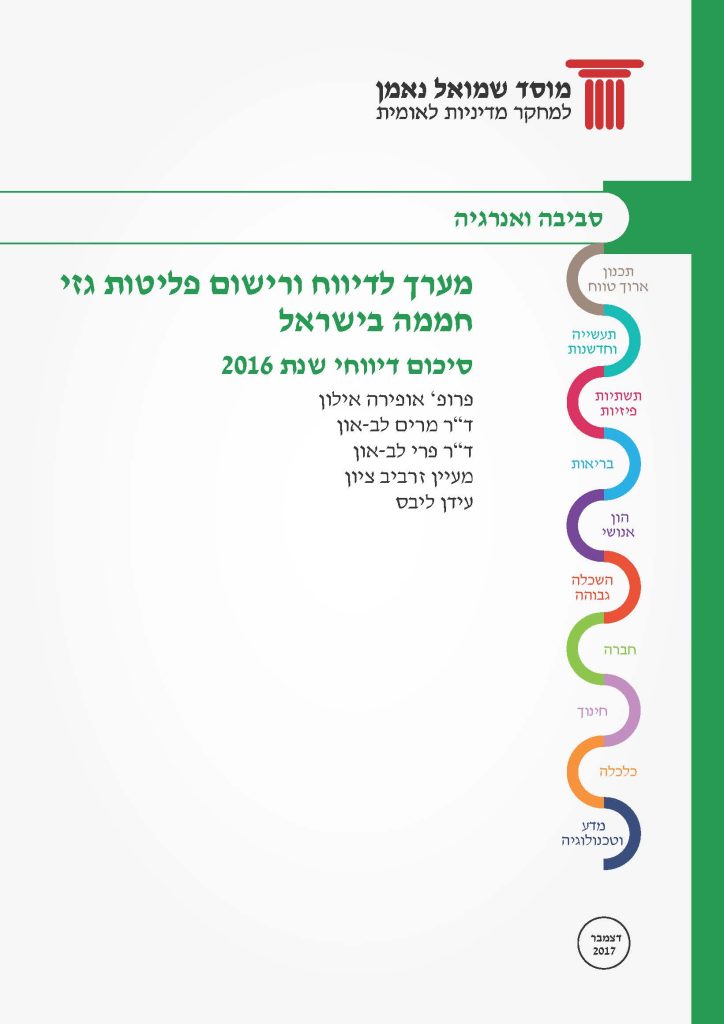Energy Forum 43: Breaking Israel’s energy isolation
The Israeli energy market has unique characteristics. One of its main problems is that the state is isolated from its neighbors in terms of energy supply and export, making it a kind of “energy island.” This applies to various fuels, such as natural gas, and to electricity: the state provides itself with electricity and is […]
Greenhouse Gas Emissions Reporting and Registration System in Israel: Summary of Reports for 2016

63 companies and organizations submitted their reports to the Voluntary GHG Registry in 2016 to the Ministry of Environmental Protection. Each of the reporting companies, enclosed a signed statement regarding the reliability of the data, as required by the Reporting and Registration System, which was developed by SNI in cooperation with the Ministry of Environmental […]
Education of engineers in the 21st century: Global aspects and implications to Israel
The Neaman Institute has initiated a national process to re-evaluate the education of engineers in the academic institutes in Israel with the objective to train a young generation of engineers with the abilities to promote innovation in the hi-tech and traditional industries as well as harness the frontier of science for these purposes. The present […]
What is happening inside the Haredi Home – Review of several aspects concerning the every day life of Ultra Orthodox Jews in Israel
The report focuses on four aspects related to every-day life of Ultra-Orthodox Jews in Israel at present: Coping with economic pressure; Health, food and recreational habits; Use of internet, PC’s and private vehicles; Attitudes towards seculars. Data is based on external, recent, surveys. Based on the analysis of this data, it seems that presently, between […]
Energy Forum 42: Psychological and Behavioral Aspects of Energy Conservation
In recent years, the demand for energy has been increasing, due, in part, to the growth in the population, the rise in the standard of living, and economic growth. Increasing use of energy involves the investment of financial resources, exploitation of scarce land resources, and even the intensification of the climate crisis, as the global […]
R&D Outputs in Israel- Characteristics of Inventive Activity 2000-2015
The main goal of this study is to provide decision makers with an in-depth picture on the scope and characteristics of Israeli inventive activity during the last two decades and to examine Israel’s position in the inventive arena in relation to OECD countries.
Energy Forum 41: Hybrid and electric vehicles
The development of transportation means that are not based on fossil fuels is at the forefront of the public agenda in many countries around the world. This is an effective means of preventing air pollution, reducing pollution and reducing greenhouse gas emissions. Four types of electric vehicles are sold around the world (EV – Electric […]
Israel Universities – Unique Aspects in a Changing World
This study is a comprehensive and up-to-date summary of previous studies carried out in the Neaman Institute. It combines Israeli unique aspects and global changes. The universities experience transition processes, and unprecedented integration of forces that threaten their future. The objects of this study are to present a wide view on current developments and issues, […]
Evaluating the Infrastructure Program of the Science and Technology Ministry

The scientific infrastructure program of the Ministry of Science and Technology has been operating since 1995 in order to bridge the gap between basic academic research and applied development and aim to reduce the maturation time of applied technological ideas. The program provides research grants at a stage where it is difficult for researchers to […]
Technological forecasting for scientific and technological human resources
The past two decades have been characterized by accelerated growth of new technologies in the fields of robotics, communications and information systems, nanotechnology, biotechnology, energy and more. Technologies that affect all areas of the economy (health, education, industry, agriculture, trade, etc.) and dictate new work patterns, new professions while others disappear and appropriate training and […]
